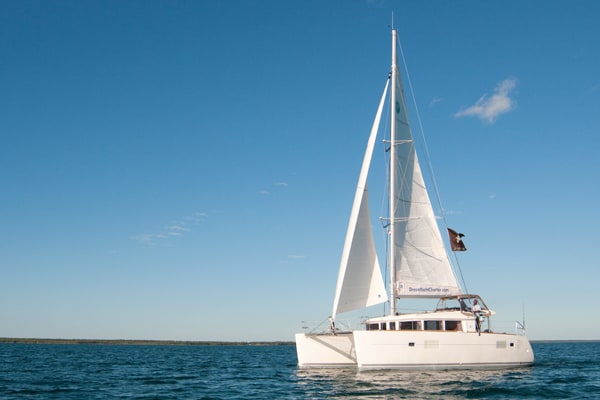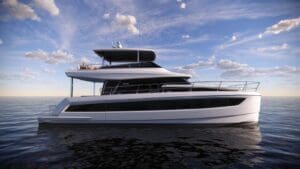Overseas Radio Network – Buying a New Vs. Used Yacht, Using a Yacht Surveyor, & Catamaran Insurance Costs
 In the Overseas Radio Network Show 5, Segment 4, we will share tips from experienced yacht brokers. We continue with these insider secrets to buying boats that can save you money when buying a yacht:
In the Overseas Radio Network Show 5, Segment 4, we will share tips from experienced yacht brokers. We continue with these insider secrets to buying boats that can save you money when buying a yacht:
- Benefits of buying a new yacht
- Using a yacht surveyor
- Boat flagging affects financing
- Catamaran insurance costs
ESTELLE COCKCROFT: Welcome back to “Yachts: The Perfect Escape Vehicle”. We were discussing insiders’ secrets to buying yachts with Gary and Stephen. And, Stephen, we were discussing the benefits of new versus pre-owned. Can you give us the benefits of buying a new one?
Transcript of this podcast below.
Benefits of Buying a New Yacht
STEPHEN COCKCROFT: I will give you a few pros and cons. Surprisingly there are not many choices in new boats there are probably 5 to 7 main manufacturers in the world and they manufacture a range of boats starting at in the thirties (feet) and ending in the fifties (feet). There’s some substantial price fluctuation so you know your choices in you are limited because obviously the manufacturer…the range of catamarans manufacturer definitely zeroed in narrowed down to not as many as they used to in the old days.
The good thing about a new boat is obviously there are no inherited problems. If you buy used boat you often inherit issues and latent defects that you find out about later. If you buy a new boat, you also get the latest designs materials. And constructions have change substantially over the years in the old days they used to be very heavily built because no one really knew how strong fibreglass was. In today’s designs, the engineering is far advanced and so you find that there’s far likely construction, mostly now instead of hand laminates and bulkheads, they’re resin-infused.
Lots of foams and cores are used today. So Kevlar carbonite materials are used to keep weight down. So overall technology in new boats is certainly come along way and if you buy new you benefit from the new boat. Also, new boats, because they carry warranties, they have lot less maintenance in the first 5 years. So if you a buy new boat, you have relatively trouble-free for the first 5 years so that includes the sails props everything you know the boat should give you very little trouble after that it becomes, it exponentially goes up.
If you finance a new boat, generally finance companies are happier with a new boat. They don’t even require a survey on a new boat. They accept that the manufacturers produce a new boat for you and so your interest rates are low. But, of course, the other thing, the negative side to that is that new boats depreciate quicker. Much like a car when you drive it out of the showroom, the value drops. So you have to accept that your boat’s gonna depreciate. A new boat’s gonna depreciate very quickly at the beginning and stable out after 3 or 4 years. So if you are in a 5 to 10 years cycle, it shouldn’t really matter too much to you, but it is something to consider.
Lastly, new boats, just like used boats, and if you are going to go cruising on a new boat you should probably take position of it about a year before your intended departure date so that you time to sail it and get all the bugs out of it. You know, a lot of these boats will be covered by manufacturer equipment warranties, so it is not a big deal financially, but when you leave you want to know that all the bugs are out of your boat. Gary is going to give us some info on the pros and cons of used boats.
Benefits of Buying a Used Yacht
GARY: Remember that when you’re looking for used boats, there are many more choices. For example, today in the world, if you are looking at 30ft and larger, there are over 120, 000 used boats available in the world. If you look at the different models of new, there is vastly less so you got more choices.
Another thing about used boats, sometimes you can get more boat for the money, you know, because they do depreciate you can get a bigger boat for less. And talking about depreciation they typically depreciate in the first year around 15% to 20%, second year it is somewhat less, let’s just say 12%, 3rd year 10%. It’s at some point the depreciation can level off and it can stop. What I have noticed is that generally in the sixth or seventh year, the depreciation will stay steady if you maintain the boat to a reasonable condition and so you may want to try when you are buying a boat to capture the most depreciation for the newest boat so I would consider looking at like a 3-year-old boat or maybe a 4 year old boat to do that.
A problem with used boat is you can inherit problems. Now in the process of buying a used boat you will engage a marine surveyor which we are going to talk about later. But they generally will inspect the boat and tell you what all the defects are that are going to have to be remedied for the intended use. So you always want to tell your surveyor you are going to sail around the world or are you going to coastal cruise or you are going to park in a marina and sit in it somewhere or you just want to tell him what you are going to do with the boat.
ESTELLE: Talk about older boats, we have a funny story about old Prouts. Prout has been built for 40 years or more and these boats are heavy, heavy boats. They don’t sail wonderfully, but, boy, their owners love them and you can buy them for a song if you can find an owner who will actually give it up. So now we have the pros and cons of new and old or new and pre-owned rather. [Check out our guide to buying new vs. used catamarans.]
Using a Yacht Surveyor
Gary, you started talking there about surveyors. What tips do you have for us about surveyors?
GARY: Well, you want to hire a surveyor who specializes in the type of boat that you are looking for. Surveyors are kind of like lawyers. If you ask a lawyer, “Can you advise me on this?”, or whatever they all say, “Yeah, of course,” but then they will go hire a specialist to actually do the work. You know what I am saying? And a surveyor is kind of the same way. They may bluff you and lead you to believe that they know more about that particular type of boat than they really do.
So I would always try and find a specialist for the type of boat that you are looking for. And if that is a catamaran, you want to find a catamaran specialist. If it is a trawler yacht, look for somebody like that. And your broker can tell you who they are. One question to ask them is, “How many boats like this have you surveyed in the last year? And if he has done less than about 5, you may want to keep looking for another surveyor.
STEPHEN: Well, generally, what I think the smart thing to do is to ask your broker to give you 5 surveyors that he as vetted. And then you make the final choice so that the surveyor ultimately is working exclusively for you. It is just a good failsafe to know that you have actually appointed the surveyor and he is working specifically for you.
Boat Flagging Affects Financing
Another interesting issue when you are buying your boat is flagging. This is a decision that you need to make. If you are going to finance the boat, generally you are going to have to flag it in the US because the lender wants to have a lien-able document. If you can buy the boat cash it is a very good thing to flag it offshore. Flagging offshore has a lot of advantages. Of course the biggest advantages is that if you offshore flagged, you have no federal taxes and you have no state taxes. If you want to bring the boat into the United States, you bring it in on what is called a cruising permit. And it is good for 1 year and costs $19 bucks. There are restrictions: every time you move you have to report to the Department of Homeland Security, but it is a pretty streamlined process. Now it’s an 800 number you call in to report that you moved and everybody is happy.
You need to leave once a year for 14 days and when you return, the authorities will reissue your cruising permit for another 1 year. A very popular jurisdictions are the Cayman Island, British Virgin Islands, St. Vincent and the Grenadines, and you will see that a lot of the boats that travels between the US and the Med(iterranean) actually have flagged the jurisdictions which would bear their own taxes. It is just a small price to own a boat in a foreign corporation.
Catamaran Insurance Costs
GARY: I was asked to talk about insurance because we have about a minute to go. And what I would tell you about that is that you want to not over insure your boat. Many people will call their agent and say I am going to cruise around the world blah, blah, blah. Well you are going to pay a lot more money if you tell them on that, the best thing to do is to say okay this spring we are going to go from Florida to the Bahamas and then we are going to take it from there.
So when you book your insurance, just book that area that you are going to go to for the next 6 months. And then when you are ready to move on you tell your agent, “Okay, we are going to go south some more,” and they will just change the binder and get you insured for that other area. You also want to own want to work with agreed-upon value policies, because they can’t depreciate the boat.
—> UPDATE: Read our detailed article about how to get the best coverage and rates on yacht insurance.
Well, we are running out of time and you have been listening to “Yachts: The Perfect Escape Vehicle”. This has been Gary Fretz, Stephen Cockcroft, and Estelle Cockcroft. We will see you next week at 3PM Eastern Standard US time on the Overseas Radio Network.





